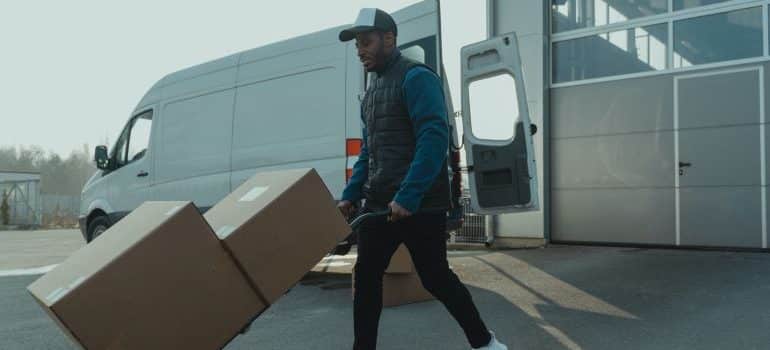Do you need moving insurance?
Relocating in South Florida means sunshine, sea breezes, and the real risk of damage to your belongings during a move. Between unpredictable weather, high-rise living, and congested roads, moving in the Miami area brings challenges that make coverage more than just a good idea. You need moving insurance in Florida to help you protect what matters most while your life’s in transit. Therefore, use our Pro Movers Miami guide to get clear, local advice that helps you move smarter and safer.
What moving insurance means
Moving insurance protects your household goods during a move. It compensates you for loss or damage while your items are in transit. This includes local, interstate, or international moves. Some policies cover storage as well.
Moving companies usually offer different levels of liability, but these are not full insurance policies. Instead, they provide valuation coverage, which has strict limits and does not guarantee full replacement.
If you need full protection, you’ll want an actual insurance policy, often offered through third-party providers. Investing in moving insurance brings peace of mind, especially during hurricane season or when transporting valuable household items.

Why moving insurance matters in Miami
In Miami and surrounding counties, moves face extra challenges compared to other parts of the country. High humidity can damage wood and electronics. Narrow streets and heavy traffic increase collision risks.
Hurricane season, which runs from June through November, brings major threats to outdoor storage and delay-sensitive moves. Some buildings in Miami require a Certificate of Insurance (COI) before allowing movers to enter. Without coverage, access may be denied, delaying your entire move.
Lifts, narrow stairs, and tight hallways pose serious risks. Hence, without proper insurance, you might absorb the cost of cracked TVs, shattered mirrors, or damaged artwork.
Types of moving insurance available
There are generally three types of moving coverage. Released value protection is the most basic level of liability. It is typically included at no extra charge, but coverage is limited to about 60 cents per pound per item. That means a 30-pound flat screen worth $500 might only receive $18 in compensation. This option suits people moving low-value goods or items they can afford to replace.
Full value protection offers greater coverage. It holds the mover responsible for either repairing damaged items, replacing them, or paying their current market value. This option costs more but provides real protection if something important gets lost or broken. Clients with luxury furniture or designer interiors often choose high-end movers to ensure white-glove service and premium protection.
Third-party insurance fills the gap between basic liability and full protection. If you’re moving valuable items or relocating during hurricane season, third-party insurance offers tailored policies that include water damage, theft, and high-value declarations.
Always read the fine print. Not all insurance providers include hurricane season moving protection. Ask about exclusions related to natural disasters, especially in coastal counties like Monroe and Miami-Dade.

What moving insurance in FL typically covers
Standard moving insurance or full value protection usually includes:
- Accidental damage during loading and transport
- Theft of items while in the mover’s possession
- Loss or destruction caused by mishandling
- Coverage for breakable items if professionally packed
If you’re using multiple moving teams or long-distance transport, confirm multi-leg coverage with your provider. Delicate pieces like sculptures and paintings should be handled by experienced fine art movers trained in protective crating and specialized transport.
What Florida moving insurance usually excludes
Most moving insurance won’t cover everything. Exclusions may include:
- Items of extraordinary value, unless declared in writing
- Loss caused by poor or improper self-packing
- Water or weather damage not explicitly covered
- Jewelry, cash, or documents
- Damage that occurs after delivery or outside of the mover’s custody
If you want coverage for fragile items like artwork, electronics, or glass, make sure they are noted on your inventory and packed professionally. When relocating heirlooms or rare collections in FL, trusted antique movers use custom padding and techniques designed to preserve historical value.
How to choose the right coverage in South Florida
Start by evaluating your risk. Are you moving in the Miami area during peak hurricane season? Do you own expensive furniture, electronics, or artwork in need of coverage? Will your items spend time in storage?
Compare quotes between full value protection and third-party options. Ask moving companies if they offer extended coverage tailored to Florida weather conditions. Confirm what kind of claim process each policy requires and how fast they respond to damage reports.
Before selecting a provider, compare detailed moving quotes in Miami to find the best balance of service, insurance options, and cost transparency. If you’re renting or buying in high-rise condos or managed properties, ask management about COI requirements and minimum liability amounts.

Packaged with answers: Your moving insurance FAQ
Even the best-packed move leaves room for questions. Here’s a bundle of quick answers to the most common things clients ask when protecting their belongings across Miami and beyond.
What’s the difference between valuation vs insurance?
Valuation is a mover’s liability based on weight, not item value. Insurance involves a third party who reimburses the actual value or replacement cost, offering more complete protection.
Is moving insurance mandatory in Florida?
It’s not required by law, but many buildings in Miami require proof of coverage before allowing movers to enter. Skipping insurance isn’t advisable as it increases your financial risk.
Does it cover natural disasters?
Some policies do, but most exclude hurricane or flood damage unless clearly stated. Always ask for hurricane season moving protection if relocating between June and November.
Can I get coverage for a DIY move?
Yes. You can purchase third-party insurance even if renting your own truck. Make sure the policy covers loading, unloading, and transit.
How do I file a claim after the move?
Document everything before and after the move. Take photos of damaged items. File the claim within the time window specified in your policy, usually 30 to 90 days.
Still have questions or need help choosing the right coverage? Pro Movers Miami is here to guide you through every phase of your move with expert support and fully insured services. Get in touch with our team today to schedule your move or ask about customized protection options.
